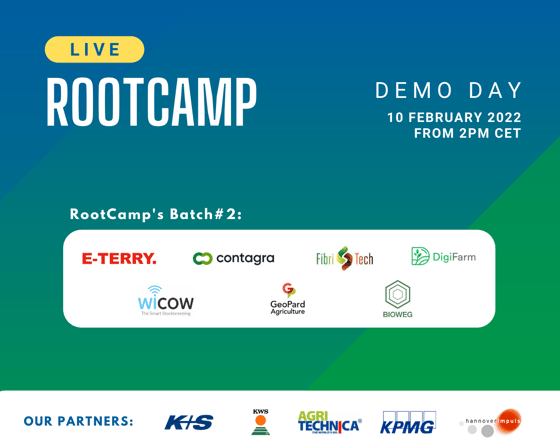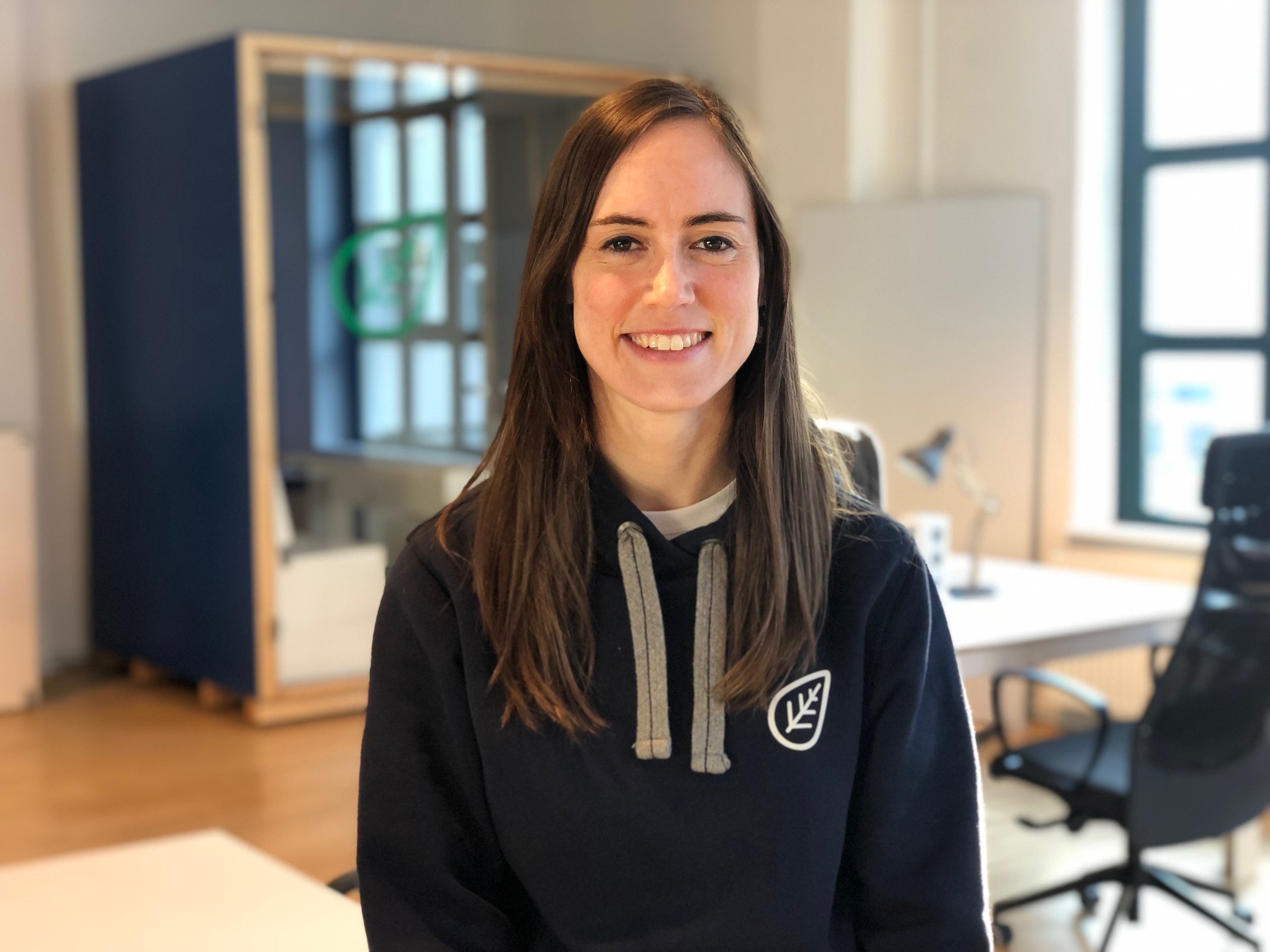The RootCamp Demo Day is designed as an exchange platform for the agrifood tech scene in which corporations, investors and startups can discuss current topics like sustainability, circular economy, green packaging, digitalization of agriculture, and soil improvement techniques. Let’s see what happened this year and how we celebrated the Batch #2.

The event
This year RootCamp celebrated its second Demo Day on February 10th together with its partners K+S, KWS, Agritechnica, hannoverimpuls and KPMG.
Over 200 tickets were sold on the digital platform Hopin and over half of the digital attendees came from outside Germany. Live on stage from the RootCamp’s office were Philipp Rittershaus, managing Director of RootCamp, and Gaia Amatteis, Program Manager. The format was straightforward: 7 startups pitches, 2 panel discussions and networking.
Get to know our startups
RootCamp early-stage startup program is an entrepreneurship program that helps accelerate participants' businesses thanks to mentoring, individual coaching and hands-on experience through pilot projects with our partners. The program culminates in the Demo Day where startups present their business ideas after 12 weeks of intense coaching.
This year the 7 startups in the program were selected from more than 300 applicants from all over the world. The program lasted 12 weeks and startups received individual coaching and mentoring on the main business areas: legal, tax, IP, business model, financial planning, fundraising, marketing, sales and pitch training (more than 150 hours from more than 50 mentors!!!).
The startups of Batch #2 came from different countries (Germany, Norway, Poland, Turkey, India, South Africa, Belarus) and from various industries (Software-as-a-Service, marketplaces for products, goods or services, sensors for livestock, biomaterials, robotics). Three out of three startups (DigiFarm, Bioweg and FibriTech) that ran for the EIC grant won the prize with a collective 6,7M euro. Moreover, E-Terry won the prize as Best Innovative Ag Robotics Startup 2021 by World FIRA.
Here are the founders that pitched:
- Nils Solum Helset from DigiFarm (NOR): Field boundaries detection technology
- Dmitry Dementiev from GeoPard Agriculture - Precision Agriculture platform (GER/BYS): Precision agriculture platform
- Helmut Drewes from Contagra (SA/GER): Credit marketplace
- Dr. Prateek Mahalwar from BIOWEG (GER/IND): Biodegradable biomaterials from microbial cellulose
- Tomasz Ciamulski from FibriTech (PL): Binder-free fiber products
- Tolga Çırak from wiCow (GER/TUR): Sensors for livestock
- Martha Wenzel from E-TERRY (GER): Robotics
➡️ If you want to watch their pitch, watch the video below.
Panel discussions
The first panel discussion called “Biotech vs AgriTech - sourcing the impact” was moderated by Caspar Olenhusen, Startup Coach at RootCamp. In the panel we tried to mix different perspectives: the corporate perspective with Dr. Alexander M. Wiegelmann, Head of Transactions at KWS, financial with Alexander Engelke, Advisor at Rentenbank, scientific with Michał Słota, Biotechnologist and of a farmer with Christoph von Heydebreck.
The central topic was to understand the role of Biotechnology in the AgTech industry and whether these 2 industries are complementary or still far away from each other.
Key findings of the panel discussion were:
- AgTech and BioTech have a major impact on human life and health, but the AgTech industry seems to be more neglected than BioTech.
- A significant knowledge gap, lack of resources and data prevent farmers from adopting more innovative practices that could have a remarkable impact on their farms.
- Agriculture biotechnology has become one of the major investment areas in AgTech, but the potential for disruption is still significant. The lack of funding in R&D projects and the long time-to-market of new innovations obstruct the pace of innovation.
- The role of accelerators like RootCamp in bridging the gap between startups, corporates and farmers is fundamental.
- The future of agriculture should be placed on understanding the role of the different parties and how they can contribute to reducing the carbon footprint. The impact should be shown through more sustainable agricultural practices and whichever industry or product can deliver it, should receive a push.
The second panel discussion looked into the “Success factors for Industry and Startups to collaborate” moderated by Philipp Rittershaus, Managing Director of RootCamp. Part of this panel were Dirk Neumann, Head of Corporate Development and Innovation at K+S Group, Francisco Martin Augusto, Head of the Technical Customer Advisory at K+S Group, David Gebhard, CEO of Aquapurna and Felix Haarstick, Assistant Manager at KPMG Innovation.
Implementation of technology is a fundamental part of the RootCamp program. We enable the collaboration between industry partners and startups through pilot projects. After the first 3 months of the acceleration program, startups in our program have the possibility to pitch in front of a jury the pilot project idea that they will have to implement in the second phase of the program.
In the panel discussion, the parties involved discussed a specific pilot project, now finalized, that K+S conducted together with Aquapurna (RootCamp Alumni from Batch#1) as part of the RootCamp program.
Key findings of the discussion were:
- A shift in corporate culture towards innovation is needed: innovation needs to be embraced and transmitted all along the company, from top to bottom.
- Corporate governance and the decision-making system needs to be better defined to ensure speed and transparency among stakeholders.
- The failure culture needs to disappear and change into a more open and learning-based culture.
- Successful projects need to be advertised to create confidence in the ecosystem.
- To reduce the risk of cooperating, a structured process (stage-gate process) needs to be set-up and trust needs to be built thanks to open communication and regular meetings.
- Intermediaries like RootCamp are an essential part of the collaboration equation because they lower the risk for all parties involved and provide the structures and location factors required.
What’s next?
The Demo Day of Batch#2 was a blast, and we are very proud of the achievements of all startups. Stay tuned to learn more about the new batch of startups and the result of the implementation projects that we will present in the next months. To do so, subscribe to our newsletter!
/rootcamp_logo_white_2022.png?width=2123&height=630&name=rootcamp_logo_white_2022.png)

/RC%20logo%202022.png?width=2325&height=703&name=RC%20logo%202022.png)




